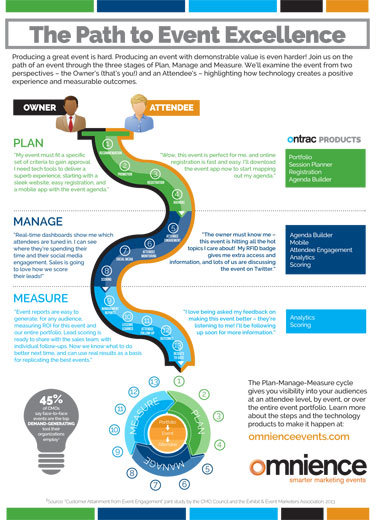Technology to make your event planning smarter
A few years ago, an executive of a very large company arrived at a big-city hotel to speak at a sales event sponsored by his company. Perusing the “Today’s Events” sign in the hotel lobby, he was chagrined to discover that his company was hosting two events at the hotel that day—both addressing the same issues and targeting the same audience! In effect, the company was competing with itself.
I love this quote from Alan Lakein, well-known author and time management expert: “Failing to plan is planning to fail.”
It’s amazing how many marketers drop the ball when it comes to planning. Citing a Marketo study, MarketingProfs reports that 34% of companies did not have documented marketing plans in 2013. My guess: If a third of marketers aren’t planning at the organizational level, a far greater percentage probably doesn’t have documented plans for specific marketing events, like the company in my opening story.
Actually, the story had a good ending. The executive’s discovery of poor planning became the genesis for a solution my company developed. It’s an event management system built on three bedrock principles:
- Every proposed event must have a plan document—much like a business plan. Before the event can be approved by management, the event owner must show that it has realistic goals and doesn’t conflict with other events.
- All upcoming events, both proposed and approved, constitute a portfolio of events supporting specific organization objectives.
- Tracking data from attendees of completed events will reveal invaluable, actionable business information.
When technology is appropriately woven into the process of planning an event portfolio, good things happen. Your staff and colleagues will learn that putting on an event is like launching a mini-business. To find out if the “business” has been successful, you’ll have to measure results. As you start tracking outcomes, you’ll spot trends earlier. You’ll gain visibility into the effectiveness of each event and the entire events portfolio. You’ll apply “lessons learned” from past events. You’ll start focusing the events budget on what is working well, and tweak what isn’t working. And you’ll get better at targeting the right audiences and giving them the quality experience they expect before, during and after an event.
Technology helps you identify and purge bad practices, too. In evaluating proposed events, you’ll readily identify duplicates and conflicts. You’ll know if a topic or geographic area is being over-saturated with proposed events. People throughout your organization will quickly learn that poor proposals won’t make the “cut” for joining the approved event portfolio.
Here’s how Omnience approaches event planning. What’s the event planning process like in your organization? Is it rigorous? Or can certain managers somehow get funding for “rogue” events? What are your secrets for keeping the events portfolio focused on realistic goals? I’d love to hear from you!




